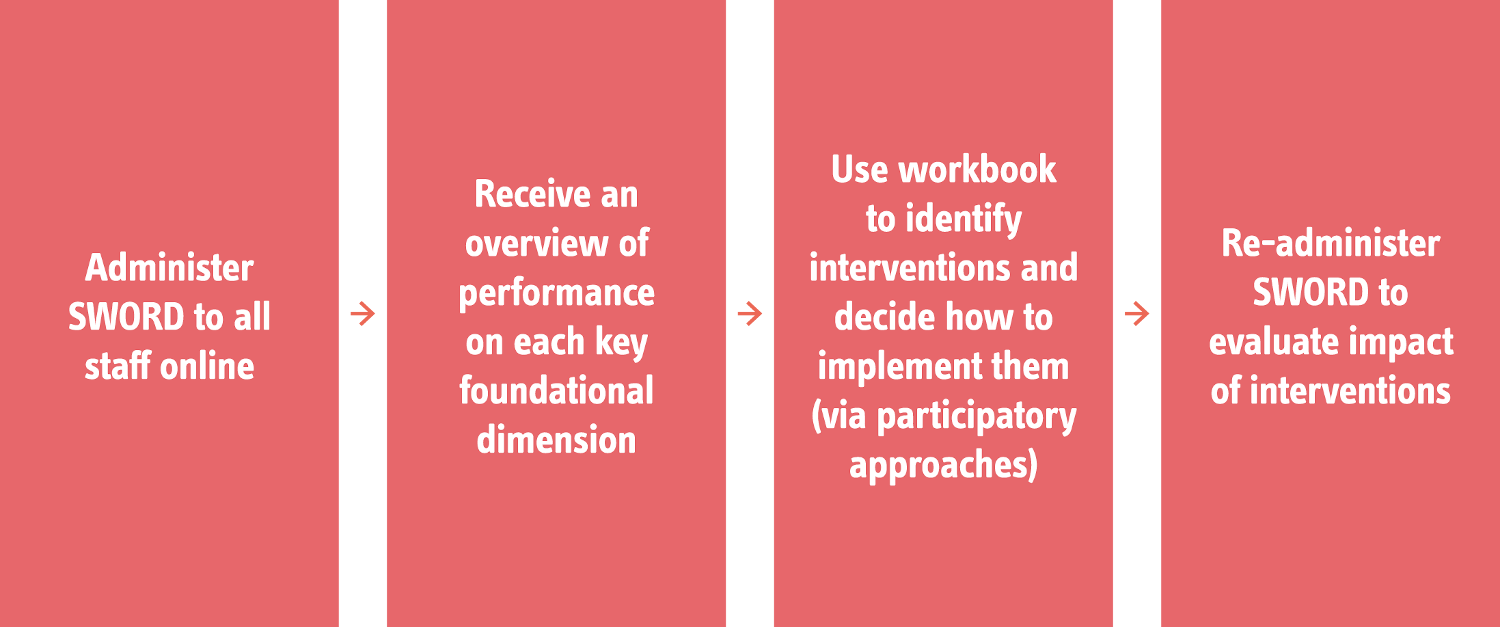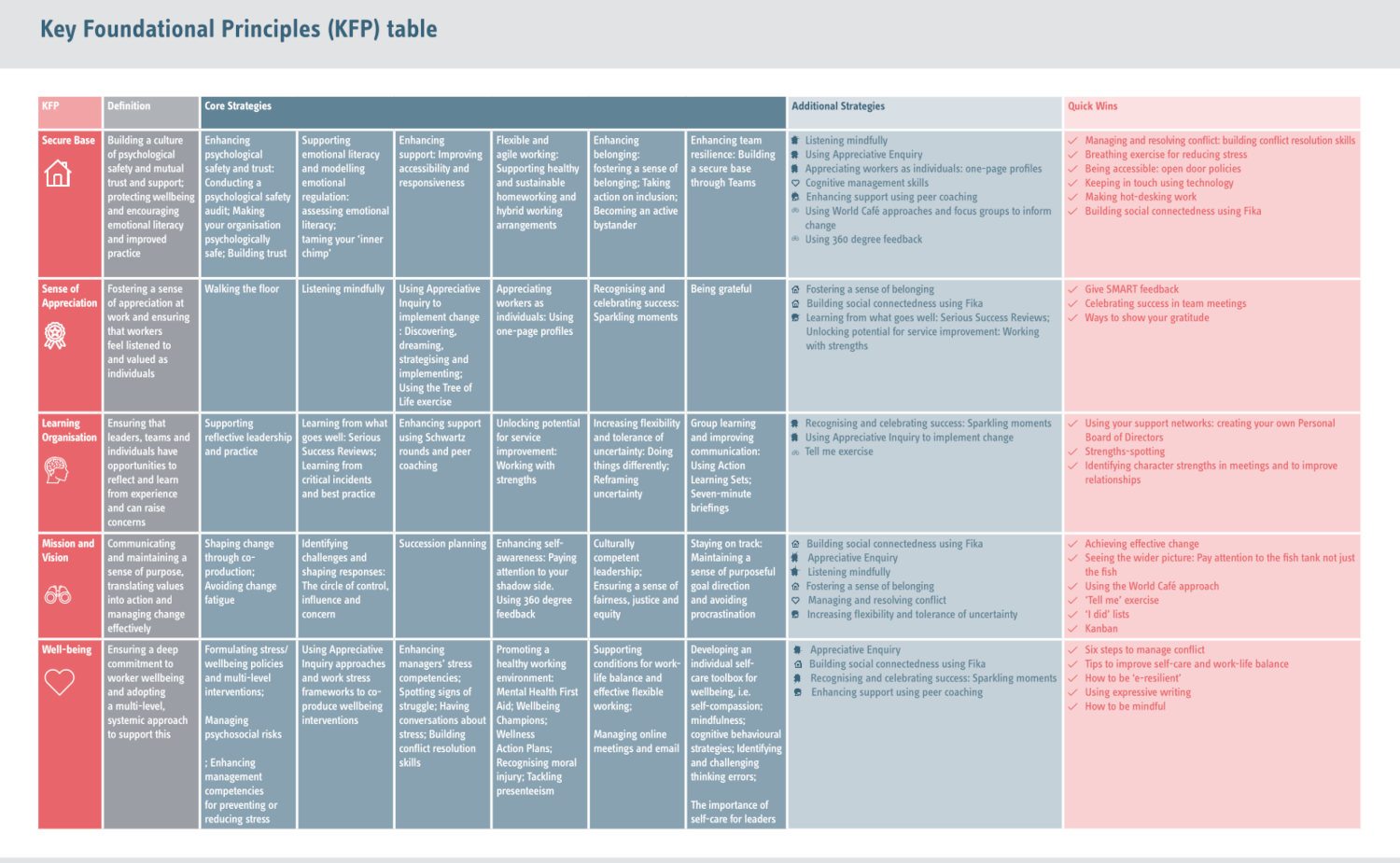Tool & survey
The Social Work Organisational Resilience Diagnostic (SWORD) tool and survey
The survey is open for a period of 6 weeks and opens Spring and Autumn 2024.
Information obtained on the knowledge, skills and abilities associated with organisational resilience has been used to develop this diagnostic tool. Its purpose is to assess, through a workforce survey, the extent to which social care organisations have in place those conditions that have been found to underpin the wellbeing of staff and promote optimum practice. The workbook is designed to be used alongside the tool, but can be used independently.
The survey was co-produced and refined over time in workshops with social care workers from a range of backgrounds to capture diversity and difference in experience. It defines each of the five Key Foundational Principles (KFPs) and asks social workers to indicate how strongly they agree or disagree with a series of statements related to each KFP. (Higher scores represent higher levels of agreement for all questions: i.e. strongly disagree = 1, and strongly agree = 6). A ‘traffic light’ system is used to assess the extent to which social workers agree or disagree that these conditions are present in their organisation:
Green = strongly agree / agree (Score 5 or 6): good practice identified.
Amber = slightly agree / slightly disagree (Score 3 or 4): some action required.
Red = disagree / strongly disagree (Score 1 or 2): urgent action needed.

Figure 1: The SWORD Tool in action
The survey findings will provide leaders with a profile of their organisation’s performance for each of the five KFPs, and with the evidence they need to address issues identified in a targeted way.
As set out in Figure 1, we recommend leaders use the tool and workbook to underpin a process of continual development to:
- Provide an initial diagnosis of priority areas.
- Identify and introduce interventions.
- Evaluate these interventions by re-administering the tool to colleagues.
Most organisations are likely to have some variation in their profiles. For example: 'Organisation A' may score highly on Secure Base and Sense of Appreciation, moderately on Learning Organisation, and fairly low on Wellbeing; 'Organisation B' might have high scores for Learning Organisation and Mission and Vision, moderate scores for Wellbeing, and low scores for Secure Base and Mission and Vision.
Download an example of an organisational profile.
Strategies for fostering the conditions required to enhance organisational resilience are set out in the five KFP sections of this workbook. The chart below, Organisational resilience: Strategies for supporting the five Key Foundational Principles (KFPs), outlines all the key strategies that support the KFPs and associated quick wins, and will help you navigate the workbook. Many strategies support more than one KFP. The ‘golden threads’ are revisited in each section, reflecting their importance in developing resilience.

Download The Key Foundational Principles (KFPs) table.
The SWORD survey
The survey is open for a period of 6 weeks and opens Spring and Autumn 2024.
We would like to thank What Works for Children’s Social Care for their consultation on the survey.
How to use the SWORD survey
Organisations must nominate a lead contact in a senior role (such as a Principal Social Worker, Head of Service) who will administer the SWORD survey across the workforce. Nominated contacts should get in touch with claire.williams@researchinpractice.org.uk to ensure their organisation can access the survey.
The lead contact will disseminate and work with teams and individuals to ensure workforce participation in the survey.
Individuals will complete the survey online and your organisation’s data will be collated and analysed by Research in Practice.
Your nominated contact will receive their organisational data returns once the survey is closed and work with management in implementing the tasks and strategies from the workbook.
SWORD survey questions
Key Foundational Principle 1 is Secure Base. This means that;
- The organisation offers a sense of protection, belonging, safety and being valued and cared for. It also fosters a culture of mutual support.
- The organisation provides a construction challenge for workers to explore fears and concerns relating to their tole and area of practice and organisational change.
- This 'sage space' provides support, giving renewed energy and resources for improved practice.
Questions:
- Leaders are available when I need support?
- Leaders take responsibility for creating a safe working environment?
- This organisation appreciates the demands of my job?
- Work-related stress is recognised as a serious issue and action is taken when required?
- I get individual support and supervision to help me manage the emotional demands of my work?
- I have a ‘safe space’ at work where I can share my experiences and raise issues of concern?
- There is an understanding of the impact of organisational change, and action is taken to manage this effectively?
- I am given opportunities to work with others to find solutions to difficulties?
- I have a sense of belonging and commitment to my team?
- Leaders are sensitive to the feelings of others and offer support?
- Shared values, principles and expected behaviours are at the heart of what we do?
- I feel respected and supported by my colleagues?
- Workers feel able to raise issues of bullying and harassment and speak up if necessary?
- I find my job meaningful?
- The organisation is proactive in promoting anti-discriminatory practice?
Key Foundational Principle 2 is Sense of Appreciation. This means that;
- Workers feel valued and that their individual talents and skills are appreciated. Leaders are visible, approachable, genuinely interested in workers and trust them to do a good job.
- Leaders understand the pressures of the work and support people by encouraging them to prioritise self-care and a healthy work-life balance.
- Leaders listen and engage with workers and provide constructive feedback.
Questions:
- I am trusted to do a good job?
- Best practice is strived for, acknowledged and appreciated?
- I feel that the contribution I make is valued?
- Leaders are open and approachable?
- People are treated as individuals and their diverse contribution recognised?
- Leaders appreciate the challenges that I face in my work?
- Leaders recognise and value the tasks that each team performs?
- Individual and team success is communicated and celebrated?
- Leaders are aware that workers have personal responsibilities, and support them in maintaining a healthy work-life balance?
- Workers are respected for their knowledge and experience?
- Workers are trusted to have autonomy over how they plan and complete their work?
Key Foundational Principle 3 is Learning Organisation. This is an organisation where;
- Beliefs, goals and objectives underpinned by a set of shared values, principles and behaviours.
- Individuals, teams and the organisation have opportunities to reflect on practice and learn from experience.
- There is an evidence-informed approach to improving practice and managing change, with individual input actively encouraged.
- Challenges provide learning opportunities. rather than lead to individual blame.
- People have the freedom to speak up to raise concerns without feeling compromised, blamed or victimised.
Questions:
- Leaders tackle difficult issues and work towards solutions?
- When something goes wrong, lessons are learned rather than blame attributed?
- I have opportunities for reflective conversations that support my personal learning and development?
- Learning and development is a priority in this organisation?
- Leaders encourage me to express my opinions and they are considered wherever possible?
- Leaders encourage open and honest communication?
- The reason for change is communicated clearly?
- Change processes are informed by evidence and clearly focus on development?
- There is a shared understanding of what ‘best practice’ looks like and how it can be achieved?
- I am given time and space to reflect on my work?
- Leaders are committed to continuous development?
- Leaders prioritise my need for supportive supervision?
- The supervision I receive helps me to develop in my role and area of practice?
- I can access the training I need to do my best work?
Key Foundational Principle 4 is Mission and Vision. This means that;
- Leaders are committed to a clear missions and visions and use their communication skills to consult with and motivate others.
- Leaders are optimistic but realistic, and focus on continuous improvement, inspiring workers to identify what 'good' looks like and how to achieve it.
- Change is managed constructively, especially during times of uncertainty.
- There is a sense of purpose and values are translated into action.
Questions:
- Leaders set a good example, which inspires me to do my best?
- Leaders are committed to maintaining values, shared principles and expected behaviours?
- Leaders are well respected?
- Leaders are self-aware and inspire and motivate others?
- Leaders have the confidence and self-belief to succeed?
- Leaders talk optimistically about the future and what can realistically be achieved together?
- Workers know what they need to do to meet goals and objectives?
- People work together to achieve positive outcomes?
- Leaders articulate a clear identity, purpose and vision?
- Change is managed sensitively, particularly during times of uncertainty?
- The organisation has an ethos which informs values, shared principles and behaviours?
Key Foundational Principle 5 is Wellbeing. This is when;
- Workers perceive a deep commitment to their wellbeing, wherever possible, stress is reduced at source and working conditions improved.
- Reasonable adjustments are made to support workers to work in ways that suit their preferences and circumstances.
- Workers feel able to thrive in a job that is rewarding and manageable and to make a difference to people who access services.
- For these reasons, people are committed to the organisation and their role within it.
Questions:
- I am treated fairly at work?
- On the whole, my workload is manageable?
- My job is satisfying and rewarding?
- My job helps me flourish and grow?
- Overall, I feel I make a difference to people who access care and support?
- Appropriate support is available to me if I have a difficult experience at work?
- I can access a range of services to support my health and wellbeing?
- I am committed to this organisation?
- My physical conditions while working allow me to do my job effectively?
- I have opportunities to debrief if I experience a difficult incident while working?
- Overall, I have a healthy work-life balance?
- If I am unwell, I can take time off to recover?
- I would recommend my organisation as a good place to work?
- I see a future for myself in this organisation?
